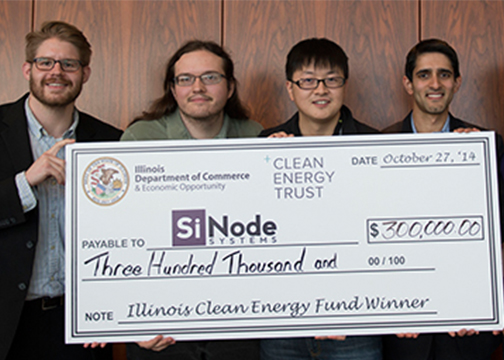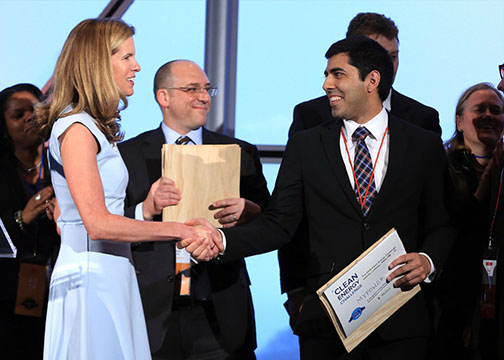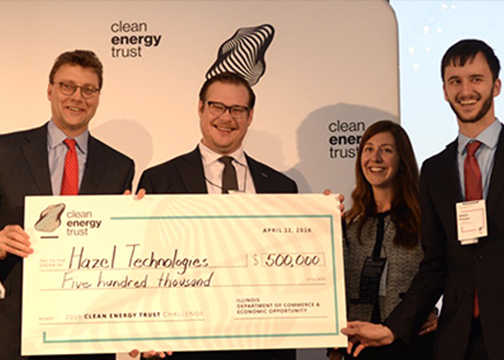SiNode Systems, an advanced battery materials company whose technology significantly improves the energy density of a lithium-ion battery was awarded $300,000 at the inaugural Illinois Clean Energy Fund (ICEF) Awards Monday.
SiNode originated at Northwestern University from research supported by institutional organizations including the Institute for Sustainability and Energy at Northwestern (ISEN), the Farley Center for Entrepreneurship and Innovation, the McCormick School of Engineering and Applied Science, and the Kellogg Innovation and Entrepreneurship Initiative.
“Investment from ICEF will help provide the anchor for our A-round of funding, which we’ll use to scale up our materials production,” said SiNode Chief Executive Officer Samir Mayekar.
ICEF was formed by the Illinois Department of Commerce & Economic Development and the Clean Energy Trust to facilitate $4.6 million of state and private investment in clean energy businesses in Illinois.
SiNode was one of four teams presenting Monday, selected through a competitive process. All presenting companies were funded at some level.
Other companies included Intellihot, a maker of tankless water heaters, $400,000; AllCell Technologies, a battery pack manufacturer, $200,000; and Agentis Energy, maker of a software platform that helps customers manage their utilities consumption, $100,000.
“The groups here today represent a good cross section of clean tech startups and energy needs in the Midwest," said Clean Energy Trust CEO Amy Francetic. “These awards lay the groundwork for more of this kind of support in the future.”
Keynote speaker and Partner at Black Coral Capital in Boston, Rob Day, who has an MBA from the Kellogg School of Management, stressed just how vital seed funding is in spring boarding the success of clean tech startups, highlighting the caliber of the companies that competed in Monday’s awards.
“I’m impressed with what these companies have been able to do with little capital, and with the materials science research that has come out of Northwestern in the last few years,” he said.
SiNode adds its ICEF funding to the seed funding it has received to date. In August, the company partnered with AZ Electronic Materials, a business unit of Merck KGaA, to jointly develop graphene-based materials for the battery market. SiNode also received a $1 million Phase II SBIR grant from the U.S. Department of Energy this past June. Among numerous accolades at business plan competitions, SiNode has taken 1st place at the US DOE National Clean Energy Business Plan Competition (June 2013) and won the Grand Prize at the Rice Business Plan Competition (April 2013).
Northwestern, ISEN Roots
SiNode technology was first developed in 2010 by Northwestern University Professor Harold H. Kung, a Walter P. Murphy Professor of Chemical and Biological Engineering.
SiNode’s success demonstrates the value of consistent institutional support for fledgling companies at multiple points in their development. ISEN has played a critical role in the bench – to – market lifecycle for SiNode, including 2009 seed funding for Professor Kung’s foundational research, a 2009-2010 Graduate Cluster Fellowship for Cary Hayner, SiNode’s Chief Technolgy Officer, and 2012 funding for half-cell validation and prototyping at Argonne National Laboratory.
The process of commercializing the prospective technology began in earnest in 2012, as part of Northwestern’s NUvention: Energy course. The class aims at exposing students to innovation and entrepreneurship within the cleantech space, and is offered by the Farley Center for Entrepreneurship and Innovation in partnership with ISEN.
SiNode has set the high mark for energy entrepreneurship at the University. Teams also making a name for themselves include 2013 NUvention alums AMPY, the maker of a wearable device that captures energy from motion to power smartphones and MeterGenius, the maker a device that allows consumers to measure their electricity use by the hour and gives them tips on how to keep usage low. AMPY has raised $240, 000 from a successful October 2014 Kickstarter campaign, while MeterGenius was awarded a $50,000 Arch Grant in June 2014.





